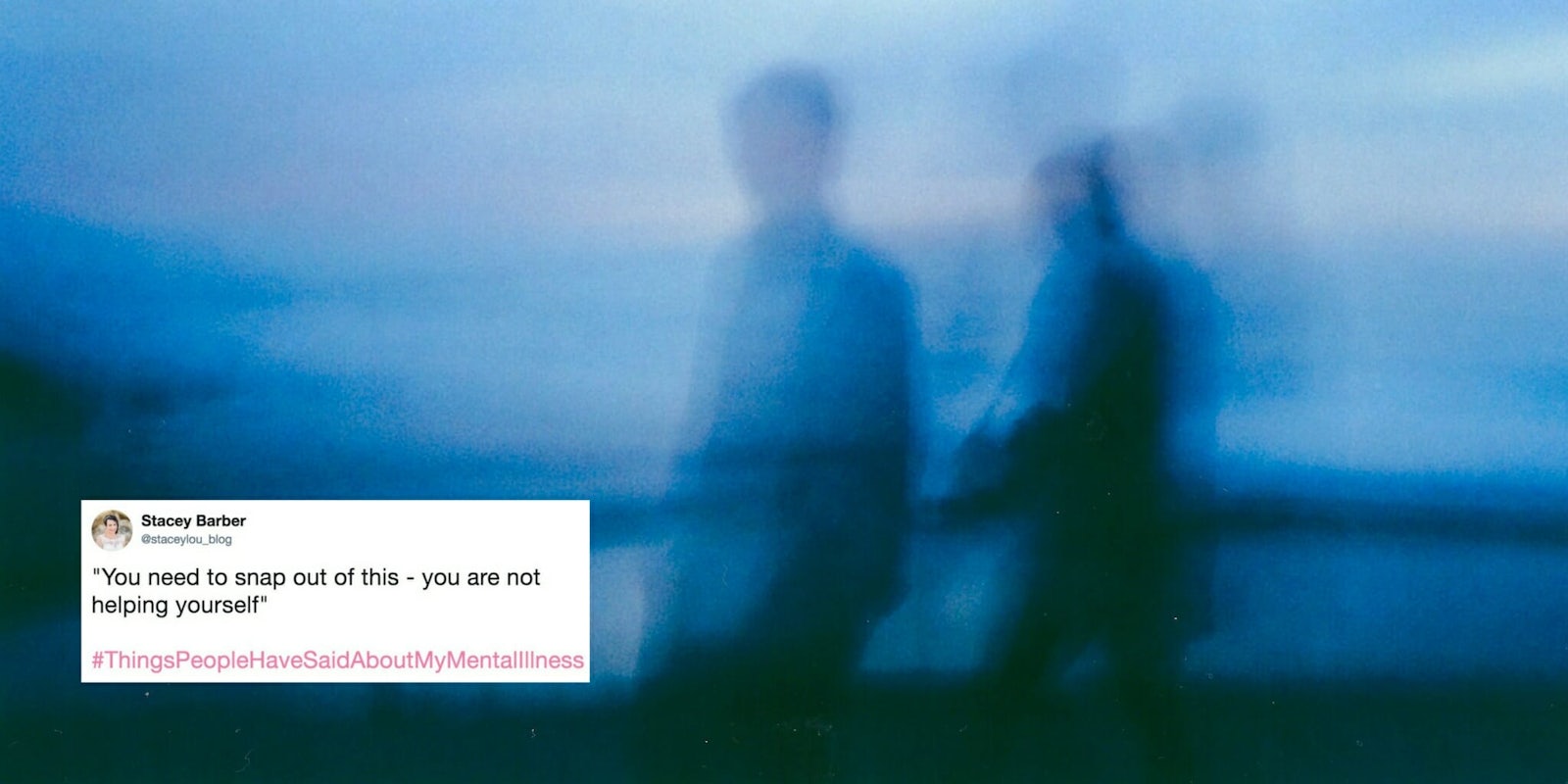Mental illness often looks a lot different to outsiders than to the person living with it. “Why can’t they just get over it?” “C’mon, they’re just sad, and they don’t have anything to be sad about.” “It’s all in their head, really.”
These are just a few of the insensitive, misinformed critiques that people who don’t live with mental illness have about those who do. They’re phrases that not only discount the person living with mental illness, but also derail the effort to normalize and effectively talk about mental health.
According to the National Center for Health Statistics at the Centers for Disease Control and Prevention, between 2009 and 2012, 8 percent of surveyed Americans over age 12 lived with depression, one of the most common mental illnesses, with 3 percent of Americans living with depression reporting severe symptoms. However, 65 percent of people with severe symptoms of depression weren’t receiving treatment, something that might be seen as more societally acceptable to seek out if we improved how we spoke about mental health.
Across Twitter, people living with mental illness are sharing their own stories of being shamed into silence by their diagnosis. Using the hashtag #ThingsPeopleHaveSaidAboutMyMentalIllness, started by U.K. reporter Hattie Gladwell, people are not only discussing their diagnosis, but are also attacking misconceptions about mental illness by showcasing the ignorant phrases they’ve been told.
For Gladwell, she was told that she didn’t need medication, but motivation to “cope” with her mental health.
https://twitter.com/hatttiegladwell/status/993194987935469568
There are the common “just get over it” and “just snap out of it” responses, said by people who don’t understand what its like to not be 100 percent in control.
https://twitter.com/Pinksandi/status/993204798462791680
https://twitter.com/staceylou_blog/status/993211217580904448
#ThingsPeopleHaveSaidAboutMyMentalIllness
— Isobel Morrice (@isobelrose27) May 6, 2018
“You’re 15/16/17…/24” now. You need to grow up.”
“Cheer up!”
“Stop feeling sorry for yourself. You’re just being selfish. Think of all th people you’re hurting by doing this.”
“That is an irrational fear, so stop being afraid of it, you’re wasting my time and all your peers time”
— Lily (@LilannePnw) May 7, 2018
Teacher then left the class until I “got over it” while all my peers yelled at me to grow up, but wouldn’t let me leave.. #ThingsPeopleHaveSaidAboutMyMentalIllness
Others think their solutions such as “thinking positive thoughts” and “going for walks” will help people with mental illness become completely “cured,” when diagnoses like chronic depression and anxiety are not something you can simply shake off.
https://twitter.com/Sophie9131/status/993207946791325696
https://twitter.com/lokivankenobi/status/993202455042248704
https://twitter.com/TariyePeterside/status/993419349900910592
https://twitter.com/lokivankenobi/status/993195265577365505
Then there are the people who think that undermining someone’s struggle with living with mental illness with the reasoning “everyone goes through this” is at all comforting. In reality, it feels like a justification urging someone to stop talking about their struggles at all.
#Thingspeoplehavesaidaboutmymentalillness “What do you mean you are disabled by anxiety? We all have anxiety!” Anxiety (disorder) from PTSD isn’t what everyone has. Crippling panic attacks and unknown triggers are my daily life. Don’t judge something because you don’t understand.
— Tanya (@_NrrrdGrrrl_) May 7, 2018
https://twitter.com/DebAdadj71/status/993414399330340864
https://twitter.com/roaddtorecovery/status/993380912200146944
Wow, where to start with this one?!
— Paddy O’Brien (@Paddy_OBrien71) May 6, 2018
“Other people have it much worse than you do.”
“Stop feeling sorry for yourself.”
“Everyone else is dealing with life, so why can’t you?”
“You’re being selfish.”#ThingsPeopleHaveSaidAboutMyMentalIllness https://t.co/tPySjTJeJh
https://twitter.com/all_outta_hp/status/993365533063041024
There are people who think that mental illness is being used as an excuse to bail, or as a justification for “not trying.” Again, it’s as if all people with mental illnesses have to do is think positively and their “problems” will go away.
https://twitter.com/Sophie9131/status/993213233799548933
https://twitter.com/peachcreampop/status/993371624316399616
https://twitter.com/MikalSalaam/status/993365705885212672
And there are people who think that being well-off in life doesn’t give people with mental illness anything to be “sad” about, as if mental illness is monetary-based.
“why are you so sad? You have a nice life”
— seven (@taroteajiminie) May 7, 2018
“why are you scared? Its just a party”
“why do you look tired all the time? You should get some sleep”
“you don’t know what stress is, you’re just lazy”
“you’re not depressed, it’s just a phase”#ThingsPeopleHaveSaidAboutMyMentalIllness https://t.co/YdAnoxZDGZ
There are the people who don’t understand suicidality nor suicidal ideations.
https://twitter.com/CreativeBinlord/status/993198469878812673
The most unhelpful thing I heard was “You’re not serious” after a suicide attempt. This was said by a psychiatric nurse. #ThingsPeopleHaveSaidAboutMyMentalIllness https://t.co/5OAEp9MHyq
— Meandmymhmatters BA (Hons) (@Meandmymhmatter) May 6, 2018
And don’t forget people who think that telling someone with mental illness that their diagnosis is something to be coveted or desired.
“It’s attention seeking” (eating disorders)
— Juliette Burton (@JulietteBurton) May 7, 2018
“You sound like a psycho” (being sectioned)
“Try NOT being sad” (depression)
“Snap out of it” (all)
“Lots of people have it worse than you”
“You don’t look ill”
“I wish I was anorexic”#ThingsPeopleHaveSaidAboutMyMentalIllness https://t.co/xEXDdf8y8M
Regardless of which mental illness posters of the hashtag were diagnosed with, these false rationalizations undermine the work done to make discussing mental illness more acceptable, and in turn, make seeking diagnosis and treatment of mental illness more acceptable as well.
For many, the hashtag showed people with mental illness that they aren’t alone in hearing ignorant, harmful statements and that others are pushing against this negative current, too.
I’m loving going in to the #ThingsPeopleHaveSaidAboutMyMentalIllness tag, not because of the things they are writing, but knowing there are so many out there that have heard the same sorta shit I have. pic.twitter.com/GHPrYw94Mi
— Meg (@avengermegs) May 7, 2018
https://twitter.com/ElleHegarty8/status/993436597113835521
If you are a teen dealing with depression or other mental health issues, see PBS.org for a list of resources and organizations that can help you. If you are an adult, see Mental Health Resources.


